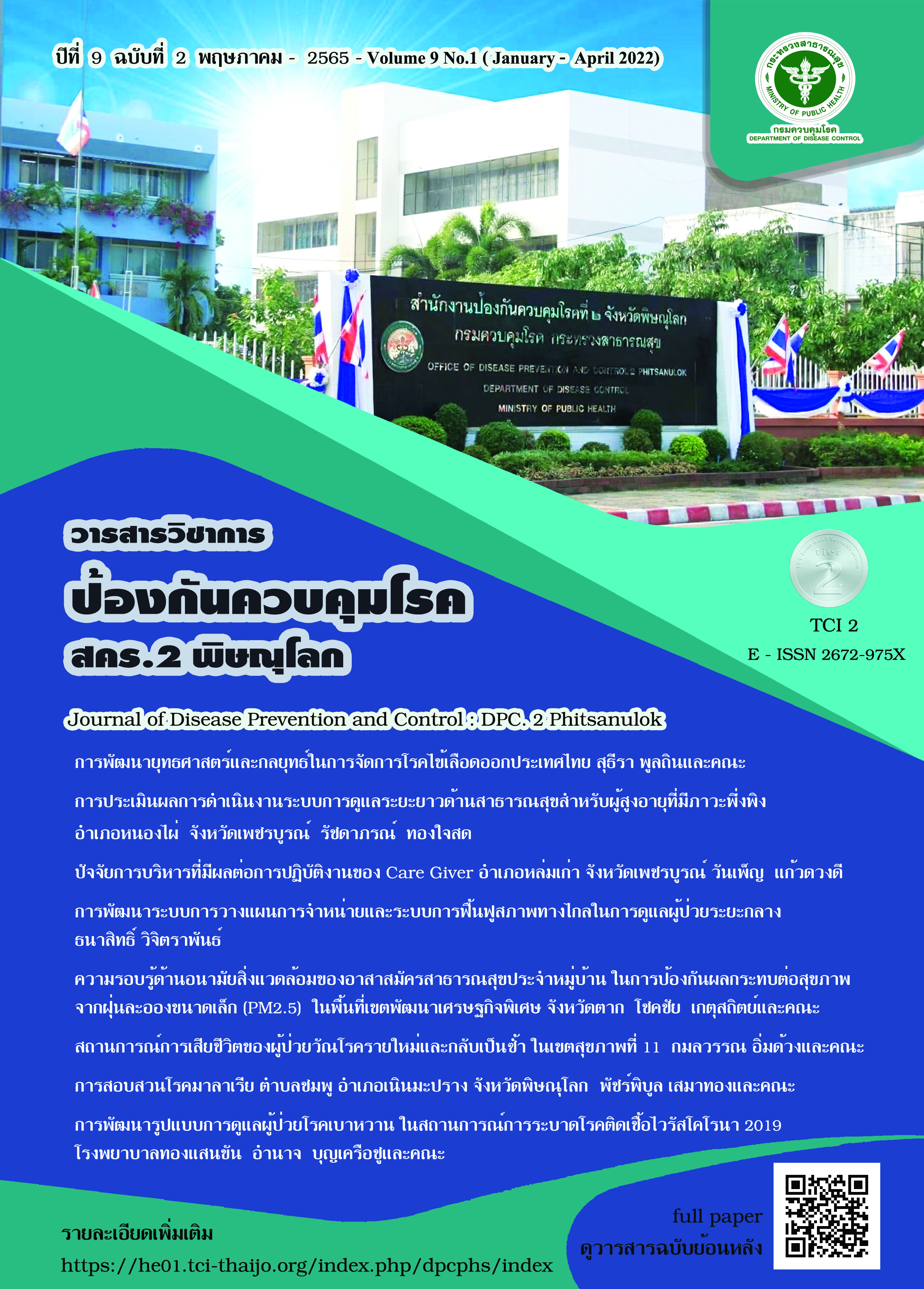การพัฒนาระบบการวางแผนการจำหน่ายและระบบการฟื้นฟูสภาพทางไกล ในการดูแลผู้ป่วยระยะกลาง
Main Article Content
บทคัดย่อ
การวางแผนการจำหน่ายและการฟื้นฟูสภาพมีผลต่อการกลับมารักษาซ้ำ การเสียชีวิต รวมทั้งผลลัพธ์ทางคลินิกในการดูแลผู้ป่วยระยะกลาง การศึกษาครั้งนี้มีวัตถุประสงค์เพื่อพัฒนาระบบการวางแผนการจำหน่ายผู้ป่วยและระบบการฟื้นฟูสภาพทางไกล ในการดูแลผู้ป่วยระยะกลางของโรงพยาบาลสันป่าตอง รูปแบบการวิจัยเป็นแบบการวิจัยและพัฒนา ทำการศึกษาเป็น 3 ระยะ คือ 1) ระยะวิเคราะห์สถานการณ์ โดยทำการสนทนากลุ่ม จำนวน 15 คน เพื่อค้นหาปัญหาของระบบการวางแผนการจำหน่ายผู้ป่วยและระบบการฟื้นฟูสภาพ รวมถึงแนวทางการแก้ไข 2) ระยะดำเนินการ โดยทำการออกแบบโปรแกรม Speedy plan และโปรแกรม Speedy tele และนำมาใช้กับผู้ป่วย และ 3) ระยะประเมินผล โดยศึกษาในผู้ป่วยระยะกลาง จำนวน 80 คน ทำการเก็บรวบรวมข้อมูลการเสียชีวิต และคะแนนกิจวัตรประจำวัน วิเคราะห์ข้อมูลอัตราการรอดชีวิตโดยใช้ Hazard ratio และ ผลวิเคราะห์ปัจจัยที่มีผลต่อคะแนนกิจวัตรประจำวันที่เปลี่ยนแปลงโดยใช้ Risk ratio การศึกษาพบว่าการวางแผนการจำหน่ายโดยใช้รูปแบบ DMETHOD-FP (Diagnosis, Medicine, Environment, Treatment, Health, Outpatient, Diet, Family meeting และ Psychology) ลดอัตราการเสียชีวิตของผู้ป่วยได้มากกว่ารูปแบบ DMETHOD โดยมีค่า adjusted HR เท่ากับ 0.17 (95% CI 0.04-0.72) และการฟื้นฟูสภาพทางไกล ผู้ป่วยมีคะแนนกิจวัตรประจำวันเพิ่มมากกว่าการฟื้นฟูสภาพแบบปกติ โดยมีค่า adjusted RR เท่ากับ 2.63 (95% CI 1.59-4.36) ดังนั้นโปรแกรม Speedy plan สามารถลดอัตราการเสียชีวิตในผู้ป่วยระยะกลางได้ และโปรแกรม Speedy tele สามารถเพิ่มสมรรถภาพทางกายในผู้ป่วยระยะกลางได้
Article Details

อนุญาตภายใต้เงื่อนไข Creative Commons Attribution-NonCommercial-NoDerivatives 4.0 International License.
ข้อลิขสิทธิ์วารสาร
บทความหรือข้อคิดเห็นใดๆ ที่ปรากฏในวารสารวิชาการป้องกันควบคุมโรค สคร. 2 พิษณุโลก เป็นวรรณกรรมของผู้เขียน กองบรรณาธิการวิชาการ และ สำนักงานป้องกันควบคุมโรคที่ 2 จังหวัดพิษณุโลกไม่จำเป็นต้องเห็นพ้องด้วยทั้งหมดหรือร่วมรับผืิดชอบใดๆ หากพบว่าบทความของท่านมีการคัดลอกผลงานทางวิชาการ (plagiarism) มากกว่า 25 เปอร์เซ็นวารสารขอปฏิเสธการตีพิมพ์เผยแพร่ทุกกรณี วิธีตรวจสอบการคัดลอกผลงานทางวิชาการ (plagiarism)
เอกสารอ้างอิง
Intermediate care service plan subcommittee. Guideline for intermediate care. Samutsakhon: Born to be pubishing; 2019. (in Thai)
Subacute rehabilitation development working group. Subacute rehabilitation and lesson learned from operation of ministry of health. Bangkok: The Thai Rehabilitation Medicine Association; 2016. (in Thai)
Khiaocharoen O, Pannarunothai S, Riewpaiboon W, zungsontiporn C. Rehabilitation service development for sub-acute patients under the universal coverage scheme in Thailand. Journal of Health Science 2015; 24(3):493-509. (in Thai)
Chiangchaisakulthai K, Suppradist W, Samiphuk N. Evaluation of intermediate care. Nonthaburi: The human resources for health research and development office; 2019. (in Thai)
Chokkhanchidchai S. Intermediate care. Preventive Medicine Association of Thailand 2019; 9(2):100.
Waewaram S. Rehabilitation nurse course for patients, handicapped and elderly in subacute care. Nonthaburi: Sirindhorn National Medical Rehabilitation Institute; 2019. (in Thai)
Kwaewkungwal J. New researcher manual: applied epidemiology and biostatistics in biomedical research. Bangkok: G.S.M. trading; 2019. (in Thai)
Lin KH, Chen CH, Chen YY, Huang WT, Lai JS, Yu SM, et al. Bidirectional and multi-user telerehabilitation system: clinical effect on balance, functional activity, and satisfaction in patients with chronic stroke living in long-term care facilities. Sensors (Basel) 2014;14(7):12451-12466.
Shepperd S, Lannin NA, Clemson LM, McCluskey A, Cameron ID, Barras SL. Discharge planning from hospital to home. Cochrane Database Syst Rev 2013; (1):CD000313.
Vipatanaporn s. The development of discharge planning model for severe head injury patients. Journal of Khon Kaen Provincial Health Office 2020;2(1):59-75.
Introntakun K, Silaguntsuti C, Vittayatigonnasak A, Supawattanaobodee B, Parklug P. Effect of discharge planning for colorectal cancer patients using METHOD-P on the knowledge of adverse reactions management after receiving chemotherapy. Vajira Nursing Journal 2020;22(1):1-14.
Tanubdet N. Service of physical therapy in stroke patients at Sanpasitthiprasong hospital, Ubon ratchathani. Sanpasitthiprasong Medical Journal 2008;29(3):167-177.
Chandeying V. Telemedicine. Naresuan Phayao Journal 2014;7(1):1-3.
Adulyathum T. cloud meeting-telemedicine . Journal of the Department of Medical Services 2020;45(2):5-7.
Dodakian L, McKenzie AL, Le V, See J, Fuhrhop KP, Quinlan EB, et al. A home-based telerehabilitation program for patients with stroke. Neurorehabil Neural Repair 2017;31(10-11):923-933.
Laver KE, Wakeling ZA, Crotty M, Lannin NA, George S, Sherrington C. Telerehabilitation services for stroke. Cochrane Database Syst Rev 2020;1(1):CD10255.


